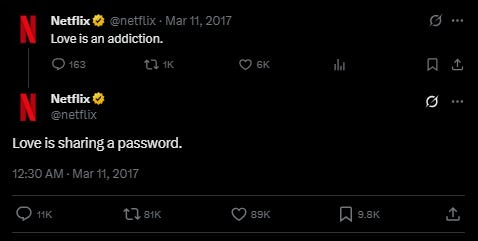The Password Problem Netflix Can’t Ignore
For years, Netflix ignored account sharing. Now, they’re clamping down. What would you do if you were the PM behind this?
Hey hey,
Another week, another tough product decision to break down.
Last time, we broke down YouTube’s ad strategy and how it affects user experience. The comment section was 🔥 — don’t miss it!
This week, we are diving into a move that’s got Netflix users split.
Netflix’s crackdown on password sharing
Netflix has always been about convenience - no ads, a massive content library, and unlimited streaming. At one point, they even encouraged password sharing.
(Yes, they literally tweeted “Love is sharing a password” back in 2017.)
That helped them grow.
More people watching meant more brand loyalty and, eventually, more subscribers.
The goal was only to get more people hooked on Netflix back then.
Even if some users weren’t paying, they were still watching. Netflix believed they might subscribe in the future.
Fast forward to today.
Things have changed.
Here's What We Know
Password sharing is no longer free.
Netflix now charges extra for accounts used in multiple locations.They’re using technology to detect shared logins.
No more casual sharing across different households.Some users are paying up, but others are leaving.
The long-term impact is still uncertain.
Think Like A PM
Why do you think Netflix is going down this path so aggressively?
If you were leading this initiative, how would you define success?
What other approaches could you have explored instead of limiting sharing?
Drop your thoughts in the comments — what would you do if you were the PM?
Thoughts From The JAPM Team
YouTube’s ad strategy isn’t just about adding more ads — it’s a balancing act between revenue and user experience.
Too many ads can push users to quit or use blockers. Too few, and revenue drops. The key? Optimise based on content length, user behavior, and engagement signals.
Short videos need fewer ads. Longer ones can handle more. A mix of skippable, unskippable, and display ads can smooth the experience.
Instead of flooding users, YouTube could explore:
User choice (e.g., one long ad vs. multiple short ones)
Smarter placement (at natural pauses)
Reward-based viewing (watch an ad, get ad-free time)
More relevant targeting
Bottom line: More ads ≠ better monetization. Smart, user-friendly ads do the trick.
See you in the comments —
—Sid




Why do you think Netflix is going down this path so aggressively? - trying to convert existing free password sharing accounts to new customers. This would increase growth of the paid customers and increase in subscriptions.
If you were leading this initiative, how would you define success? - Revenue Growth, Churn mitigation, customer sentiment and conversion rates.
What other approaches could you have explored instead of limiting sharing?
1. Price increase Option for password sharing.
2. Limit the sharing per geographic location
3. Friends/Family plan
4. Ads for non primary account holders.
1. Definitely the pie size is not increasing but competition is. Too many platforms now provide competing content especially in India and across the globe. Netflix knows playing constant catch is not sustainable and needs to monetised the existing base as much as possible (better CAC?)
2. Given that Netflix tracks IPs, location, etc to figure out multiple users, as a PM I would want to use these identifiers to create unique users at the backend and then track MoM how many get separate accesses or upgrade to shared account over time (x in x% reduction of unpaid shared accounts remains a question)
3. I would mostly not try to rile up more customers especially given that the market has too many options for the users to switch. I can allow people some base credits (mins, points, etc) which non paying users can use from the main account to watch content. Idea is not to shoo them away but nudge them for paid account. These mins/points can be bought as well instead of directly upgrading the account. This also incentivises the main account holder to distribute password more judiciously. These mins/points can only be used by non main account maybe. And at the same time start getting more aggressive on removing non paid users through force logouts.
Delayed content for non main account users can also be a way to do this. Callout that since you are a non paid user, you cannot get this content before 30 days or so